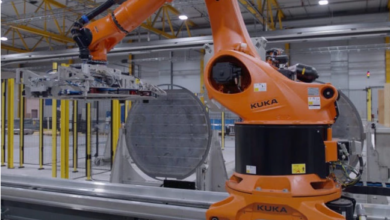ACWA Power expands sustainable energy portfolio with green hydrogen agreements

ACWA Power, a leading developer, investor, and operator of power generation, water desalination, and green hydrogen plants worldwide, has signed two significant agreements during the EBRD 2023 Annual Meeting and Business Forum in Samarkand, marking a major milestone to advance Uzbekistan’s target to decarbonise 35% of its energy sector by 2030.
The first set of agreements entails a groundbreaking partnership with Uzkimyosanoat, the national holding company for chemicals in Uzbekistan, to decarbonise the sector through innovative green hydrogen projects. Construction will be executed in two phases achieving substantial reductions in natural gas consumption and carbon dioxide emissions. The agreements were signed by Timur Mukhammedjanov, Sarvar Khamidov, Sobirjon Artikov and Marco Arcelli.
The second set of agreements involves the signing of financing documents for Karatau wind farm, formerly referred to as the Nukus Wind Project, with a total investment value of US$120 million. The National Electric Grid of Uzbekistan (NEGU) will serve as the exclusive buyer of electricity generated by the project for 25 years. The Uzbek Ministry of Economy and Finance (MoEF) has provided support for the project through the Government Support Agreement (GSA).
Project funding has been secured through Deutsche Investitions (DEG), the European Bank for Reconstruction and Development (EBRD), and Proparco. The financing agreements were signed by representatives of DEG, EBRD, Proparco, and Mr. Mohammad Abunayyan.
“We are excited about the limitless possibilities this agreement brings, positioning UKS as a key player in the emerging Green fertilizers economy. It is a testament to our commitment to innovation, environmental stewardship, and building a prosperous, low-carbon future for our citizens and the world, said Timur Mukhammedjanov.
“This signing represents a significant step towards achieving our ambitious renewable energy targets. Green hydrogen holds immense potential to transform our energy landscape, attract investment, and foster innovation, positioning Uzbekistan as a regional leader in the green economy, said Sarvar Khamidov.
Marco Arcelli expressed his enthusiasm for the Uzbek government’s commitment to decarbonisation and investments in energy diversification. We enable sustainable growth of communities around the world by providing competitive power and water desalination solutions, and in green hydrogen, we are the first mover in the industry with our participation in the Neom Green Hydrogen Project with Air Products and Neom. Our team has done a magnificent job to launch our second project in Uzbekistan together with Uzkimyosanoat and the Uzbek government to make the chemical industry in Uzbekistan a world leader in decarbonisation. Moreover, the financial close of the Karatau wind project with the support of EBRD, DEG, Proparco and the Ministries of Energy and Investment, Industry & Trade of Uzbekistan is a key milestone in the installation of about 5,000 MW of capacity in the country by ACWA Power, which will reduce CO2 emissions by over 6 million tonnes by 2030.
The green hydrogen agreement with Uzkimyosanoat is the first project of its kind in Central Asia. The initial phase, valued at around US$100 million, will be located in Tashkent region and aims to produce 3,000 tonnes per year of green hydrogen for the Uzbek chemicals industry to save up to 20.4 million cubic meters of natural gas annually.
The first phase is a step towards a bigger project, the second phase, with an investment of US$4 billion, which will include scaling up green hydrogen production to 120,000 tonnes per year. The facility will save a total of 830 million cubic meters of natural gas annually and contribute to the reduction of 20 million tonnes of CO2 emissions. The project will also integrate world-class renewable energy technology with a capacity exceeding 2.6 GW.
By embracing green hydrogen and replacing fossil fuels, Uzbekistan will make significant progress in reducing its carbon footprint and become a key partner for Europe in the supply of solutions for hard-to-abate sectors.
The Karatau Wind Project, with a capacity of 100MW, is expected to achieve commercial operation in February 2025.
